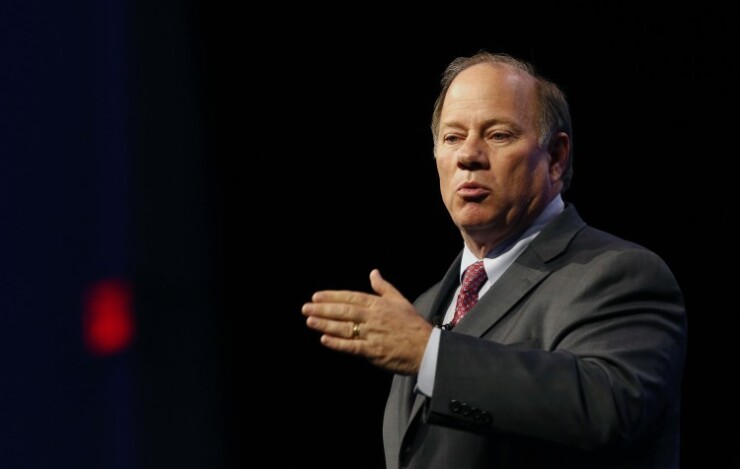Proposed changes to Detroit's city charter threaten its solvency, Mayor Mike Duggan warned this week.
The 2018 Detroit Charter Commission’s draft recommendations would pile on to the city’s operating costs, putting the city at risk of returning to state oversight and potentially pushing it into another Chapter 9 bankruptcy, Duggan administration officials warned. The proposals still remain in draft form.
“I’m hoping the charter commission doesn’t just write down whatever idea they have but they actually go back and responsibly make sure that we are not sending the city back into financial crisis,” Duggan said when asked about the recommendations Wednesday. “There’s been absolutely no effort made to take this collection of ideas and price it out.”

City officials estimated the charter revisions as proposed would cost the city $850 million annually driving a $3.4 billion deficit over four years.
The
Some of the proposals, according to published reports, would establish in the charter rights to housing and the "the fulfillment of basic needs" like food and utilities.
The
In a worst-case scenario if the city returns to Chapter 9, few assets are left, Duggan said.
“I would say that this charter as proposed is a dire threat to the pension of every city of Detroit retiree,” Duggan said. “There’s no art left. That gotten taken off the table. There’s no swap bonds to cancel. That’s been taken off the table. If the city of Detroit is back in bankruptcy the only asset left is the pension fund.”
Detroit shed $7 billion of debt with bondholders taking steep haircuts. The city exited Chapter 9 in late 2014. The Detroit Financial Review Commission released the city from direct state oversight in April 2018 after it met various thresholds on balanced budgets and other fiscal targets required as part of its confirmation plan.
Pension benefits were cut in the restructuring but the cuts were limited as part of the so-called Grand Bargain with a philanthropic consortium donating funds to limit cuts and avert the possibility that assets of the city-owned Detroit Art Institute museum would be sold.
Duggan’s finance team laid out its concern that the proposals could result in an imminent “fiscal crisis” in a Feb. 19 memorandum that was first reported by the Detroit News.
The comment period during the commission’s “discussion phase” closed Feb. 12 and the commission is now in a “review phase” which is expected to conclude Saturday. A draft of proposed changes would then go to the Michigan attorney general. The commission’s timeline anticipates a vote on the final revisions in June and an Aug. 3 referendum.
The charter was last revised in 2012. It establishes the ground rules for government operations, details the roles of the executive and legislative branch, enables the election process and mandates the departments, programs and services the city must provide.
Charter members could not immediately be reached to comment but in the Detroit News story this week members countered the city’s memorandum was submitted after the Feb. 12 deadline and lacked specific details.
“We will consider any responses and recommendations that are supported by some type of factual documentation,” charter commission Vice-Chair Nicole Small told the publication. The commission is considering the fiscal impact of proposals and will continue to make revisions.
The city is also grappling with a weaker budget picture for the current year and lingering pandemic impacts expected until 2024, according to revised revenue estimates approved last week at the city’s annual February Revenue Estimating Conference.
Revised general fund revenue projections for the current budget — for the fiscal year that began July 1 — are down $58.5 million or 5.9% to $931.1 million. That figure is also down by $252.6 million from pre-pandemic estimates from the February 2020 conference.
Fiscal 2022 revenues are now forecast at $1.09 billion, an increase of $161 million or 17.3% over the last projections but still down $103 million or 8.6% from pre-pandemic estimates. The forecast assumes nonresidents will gradually begin returning to city workplaces and casino operations begin normalizing through this summer and fall.
The city
“The challenging revenue and economic outlook will require the city to focus on controlling costs, while making targeted one-time investments to protect city residents and support the city’s future,” said Detroit’s acting chief financial officer, Jay Rising. “What we heard today underscores the need for fiscal relief from Washington.”
Duggan will deliver his State of the City address and release a fiscal 2022 budget next month based on the new revenue estimates.
The city has won a series of upgrades since emerging from Chapter 9 but its ratings remain three levels below investment grade.
Ahead of a $175 million general obligation sale for blight removal earlier this month, S&P returned the outlook to stable from negative on Detroit's BB-minus rating.





